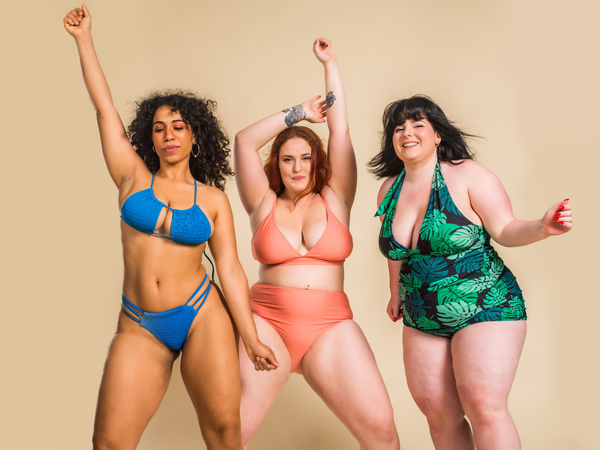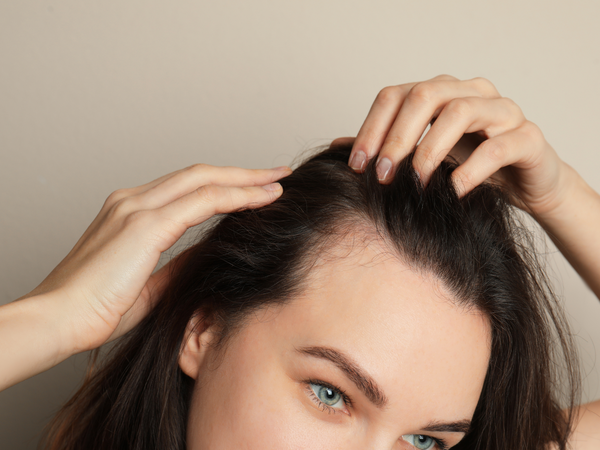Your Common Scalp Concerns Answered

Your Common Scalp Concerns Answered
Great hair starts at the root, which is why tackling scalp issues is a key part of maintaining a healthy hair care routine.
It’s easy to ignore scalp issues so long as your tresses look lovely, but if they’re not taken care of it can lead to dandruff, build up, itching, or more severe issues such as hair loss, folliculitis and eczema.
Our ayurvedic guide to common scalp concerns offers solutions to treat your scalp and support your hair, giving you a gentle, holistic approach.
Dry scalp is by far the most common scalp concern we come across. Issues like dandruff, eczema, psoriasis can all cause scalps to feel itchy, red, and flaky.
If it’s not tackled early enough, these problems can get worse over time, leading to bigger issues - dry, brittle hair, and hair breakage.
Helping to combat dry scalp is simple; use products that support your scalp. The first step is using a gentle cleansing routine, such as a no poo cleanser.
Shikakai powder mixed into a “tea” is a gentle no poo cleanser, and can act as a cooling agent on the scalp, soothing redness and itching. It also helps promote the scalp’s natural sebum production, which can help with drying scalp.
Often, harsh clarifiers or coal tar shampoos are recommended for those with dry, itchy scalps - but if it’s a consistent issue, it’s possible these are too harsh for your scalp. Some clarifying shampoos also strip the scalp of its natural oils; which exacerbates the issue.
Instead, use a natural clarifier, made with natural clays and essential oils. Use it once a month in place of your normal cleanser, to help remove build up or redness. Our own It’s Pure Clarifying Treatment uses natural hectorite clay to gently cleanse, and has skin soothing tea tree and calendula essential oils to remedy itching or dryness.
For additional treatments, pure Bhringaraj powder is an ancient Ayurvedic herb that is well reputed to aid scalps. - Traditionally it was used as a potent anti fungal and anti inflammatory, so using this as a once a month treatment on your scalp can help with itching and dandruff. As a bonus, it supports your hair; strengthening and nourishing healthy hair growth.
The use of oils is also often touted as a hair remedy, hydrating and moisturising dry lengths; but it can also be used to replenish dry scalps. Pure Macadamia and Argan Oil is gentle enough for very sensitive skin, and if used once or twice a month as a scalp and hair treatment, helps moisturise very dry skin.
Some people find adding a drop or two of peppermint oil to a scalp oil is especially soothing to dry, itchy scalps; but this is optional. If you have very sensitive skin, you might wish to avoid trying this!
2. Greasy scalp
The second most common scalp issue is greasy scalp. Overproduction of sebum in the hair can lead to scalp build up, leaving hair feeling limp, oily and greasy; none of which are desirable!
Oil is the skin’s way of making its own protective barrier, effectively hydrating itself and the hair, to prevent dryness and breakage.
Shampoos and treatments commonly used for greasy scalp and hair can have the opposite effect; while they can cleanse hair effectively, they strip the hair of its natural oils. This isn’t just drying for scalp and hair, which need those oils as a protective barrier, but it can lead your scalp to over-produce sebum to compensate - so you end up stuck in an unhelpful cycle!
To naturally aid a greasy scalp, using the It’s Pure Clarifying Treatment once or twice a month will help with any build up of oil in the hair, but it is gentle enough that it won’t strip your hair.
You can also try a treatment of Cassia, mixed with lemon juice, to aid oily scalps. Greasy hair can feel limp and lifeless, and harsh clarifying shampoos can take away shine and volume; Cassia aids this as a natural hair conditioner that restores your hair health, thickness, volume and shine.
Mixing with natural lemon juice helps, as lemon helps regulate oil production and clean hair gently, as well as aiding itchiness or dandruff that can come from oil build up in the hair. Make sure to use natural lemon juice with nothing else added.
For those with very light blonde, white or grey hair you might find this will give you a golden hue; so avoid this step if you don’t want this.
3. Struggling with thinning, lifeless hair?
If your hair is suddenly thinning or flat, it’s possible your scalp needs a little extra care, and a circulation boost.
The easiest way to get some circulation going to the scalp is by using a technique called Indian Head Massage, which we have a really helpful guide to.
Regular massage helps invigorate the scalp and increase circulation, in turn aiding healthy hair growth.
4. Allergies to chemical dyes
One of our frequently asked questions regarding scalp care is about allergies to chemical dyes; more typically, dyes that contain PPD, PTD or ammonia.
Using a henna based dye is a fantastic alternative to these as plant based dyes tend to be more gentle on scalps, and our It’s Pure range of dyes are a mix of only the purest herbal plant powders.
Henna itself is renowned for its scalp soothing properties; it is antimicrobial, antifungal, and anti-inflammatory, so it aids the scalp while giving great colour.
The most crucial thing when trying any new dye, especially if you’ve had allergies in the past, is to patch test first!
While herbal dyes are a great alternative that work for most people, it’s not impossible to have a sensitivity to them; in the same way you might to other natural ingredients, like nuts.
For more information or guidance, contact our experts here! >>>











